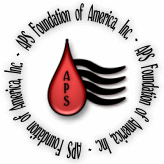Sisters' ailment identified
07/23/2007
Sisters' ailment identified
By Christy Murdoch , For the Herald-Standard
Sisters Darla Pardo and Robin L. Gibson display a variety of medications. After suffering symptoms for years, the two have been diagnosed with the blood-clotting disorder Antiphospholipid Antibody Syndrome.
After years of suffering from mysterious health problems, Robin L. Gibson and her sister, Darla Pardo, both of Fairchance, were finally diagnosed with Antiphospholipid Antibody Syndrome (APS), a serious blood-clotting disorder that can have devastating consequences.
Because of their struggle with the disease and their difficulty receiving a diagnosis, the sisters agreed to tell their story to educate the public and the medical community about APS. Their goal is simply to prevent others from suffering the way they have.
Gibson explained that APS is a blood-clotting disorder that causes the blood to be thicker than normal.
The main feature of the disorder is the development of blood clots that can occur at any time and can be fatal. She said it has been referred to as "sticky blood" syndrome.
"My sister and I have suffered for years with the disorder, but the doctors couldn't find a reason," Gibson said. "Some suggested that our problems were because of lifestyle. Others thought we suffered from anxiety and depression and prescribed antidepressants."
Gibson's clots are in the arteries, and Pardo's are in the veins.
"My doctor says I am a ticking time-bomb," Gibson said.
When the clots are in the arteries, Gibson said the consequences can be more immediate because the arteries carry blood to the major organs, such as the heart, lungs and brain. However, either condition is dangerous and serious.
Gibson, who is now 45, said her symptoms started when she was in her early 30s. She suffered headaches, left-sided numbness and occasional vision loss. She was initially diagnosed with migraine headaches.
When similar symptoms continued, Gibson was then diagnosed with transient ischemia attacks (TIAs), which in laymen terms are known as mini-strokes.
Although it was odd for a young person to suffer from TIAs, Gibson said the doctors were perplexed, but they weren't aware that there could be an underlying cause.
Eventually, Gibson suffered three strokes, leaving her with permanent body weakness, vision loss and impaired cognitive problems, such as some memory loss and confusion.
Gibson was diagnosed about 18 months ago. Her diagnosis prompted further investigation into Pardo's condition.
Both sisters now receive the appropriate treatment for APS, which is anticoagulant therapy (blood thinners), such as Coumidin or Lovenox.
Some people who test positive for elevated antibodies, but have no clinical signs or symptoms, may be treated with aspirin, making the formation of clots less likely.
Gibson said she is happy to finally have a diagnosis and to be receiving proper treatment.
"Having APS has been life-changing," Gibson said. "I was very active. It has robbed me of so many things I love to do.
"It is my hope that APS becomes more known, so others receive an early diagnosis and do not lose quality of life at a young age," she added.
It is believed that 1 to 5 percent of the population has APS, and it is a major women's health issue, according to the APS Foundation of America Inc. Web site. About 75 to 90 percent of those affected are women.
Gibson and Pardo were told that their children should be tested for the condition.
The Web site described APS as an autoimmune disorder like lupus and multiple sclerosis. APS may even coincide with those types of autoimmune conditions. The disorder is not well recognized, even within the medical community.
According to the Web site, the features of the syndrome are the development of conditions such as stroke, heart attack, pulmonary embolism and neurological cognitive problems. Therefore, physicians can miss the underlying cause and fail to order the appropriate tests for a proper diagnosis.
The human immune system fights infections by producing antibodies in the blood that bind with foreign invaders, like bacteria and viruses, and destroys and removes them, the Web site said.
According to the Web site, in autoimmune conditions such as APS, the immune system malfunctions and makes antibodies against normal tissue and organs.
These antibodies are called self-reactive and cause damage to the normal function of blood flow. The targets of the self-reactive antibodies are B2-glycoprotein 1 and prothrombin. The condition is diagnosed by assessment of clinical symptoms and laboratory blood tests.
The goal of the APS Foundation of America is to raise awareness and educate both the public and the medical community. For more information on APS, visit online at http://www.apsfa.org
http://tinyurl.com/28zk28
Labels: america, anticoagulant, antiphospholipid antibody syndrome, APS, APS Foundation, APSFA, clot, DVT, Heart Attack, hughes syndrome, Lupus, migraine, Miscarriage, pe, stroke, thrombosis, usa


